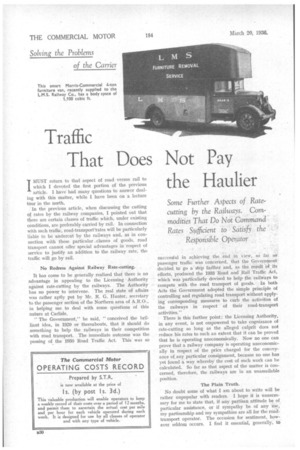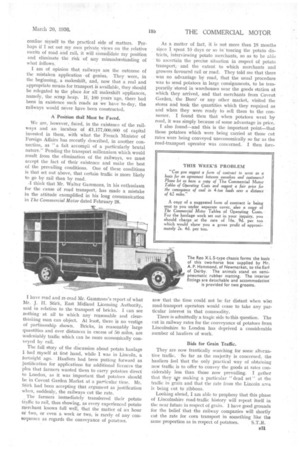Traffic That Does Not Pay the Haulier
Page 40

Page 41

If you've noticed an error in this article please click here to report it so we can fix it.
MUST return to that aspect of road versus rail to which I devoted the first portion of the previous article. I have had many questions to answer deal ing with this matter, while I have been on a lecture tour in the north.
In the previous article, when discussing the cutting of rates by the railway companies, I pointed out that there are certain classes of traffic which, under existing conditions, are preferably carried by rail. In connection with such traffic, road-transport rates will be particularly liable to be undercut by the railways and, as in connection with these particular „classes of goods, road transport cannot offer special advantages in respect of service to justify an addition to the railway rate, the traffic will go by rail.
No Redress Against Railway Rate-cutting.
It has come to be generally realized that there is no advantage in appealing to the Licensing Authority against rate-cutting by the railways. The Authority has no power to intervene. The real state of affairs was rather aptly put by Mr. R. G. Hunter, secretary to the passenger section of the Northern area of A.R.O., in helping me to deal with some questions of this nature at Carlisle.
"The Government," he said, "conceived the brilliant idea, in 1929 or thereabouts, that it should do something to help the railways in their competition with road transport. The immediate outcome was the passing of the 1930 Road Traffic Act. This was so
successful in achieving the end in view, so far .a.‘" passenger traffic was concerned, that the ,Governinent.. decided_ to go a step farther and as the result of its efforts, produced the ,1933 Road and Rail Traffic Act, which' was 'particularly devised to help the railways to compete with the road transport of goods. In both Acts the Government adopted the simple principle of controlling and regulating road transport without applying corresponding measures to curb the activities of the railways in respect of their road-transport activities."
There is this further point: the Licensing Authority, in any event, is not empowered to take cognizance of rate-cutting so long as the alleged culprit does not reduce his rates to such an extent that it can be proved that he is operating uneconomically. Now no one can prove that a railway company is operating uneconomically in respect of the price charged for the conveyance of, any particular consignment, because no one has yet found a way whereby the cost of such work can be calculated. So far as that aspect of the matter is Concerned, therefore, the railways are in an unassailable position.
The Plain Truth.
No doubt some of what I am about to write will be rather unpopular with readers. I hope it is unnecessary for me to state that, if any partisan attitude be of particular assistance, or if sympathy be of any use, my partisanship and my sympathies are all for the road-. transport operator. The occasion for sentiment, however seldom occurs. I find it essential, generally, to
confine Myself to the practical side of matters. Perhaps if I set out my own private views on the relative merits of road and rails it will consolidate my position and eliminate the risk of any misunderstanding of what follows.
I am of opinion that railways are the outcome of the mistaken application of genius. They were, in the beginning, a makeshift, and, now that a real and appropriate means for transport is available, they should be relegated to the place for all makeshift appliances, namely, the scrap heap. If, 100 Years -ago, there had been in existence such roads as we have to-day, the railways would never have been constructed.
A' Position thai Must be Faced.
We are, however, faced, in the existence of the railways and an incubus of £1,177,000,000 of capital invested in them, with what the French Minister of Foreign Affairs has recently described, in another connection, as " a fait accompli of a particularly brutal nature." Pending the transport millennium which would result from the elimination of the railways, we must accept the fact of their existence and make the best of the prevailing conditions. One of these conditions is that set out above, that certain traffic is more likely to go by rail than by road.
■ I think that Mr. Walter Gammons, in his enthusiasm for the cause of road transport, has made a mistake in the attitude exemplified in his long communication in The Commercial Motor dated February 28.
I have read and re-read Mr. Gammons's report of what Mr. J. H. Stirk, East Midland Licensing Authority, said in relation to the transport of bricks. I can see nothing at all to which any reasonable and clearthinking man can object. At least, there is no vestige of partisanship shown. Bricks, in reasonably large quantities and over distances in excess of 50 miles, are undeniably traffic which can be more economically conveyed by rail.
The full story of the discussion about potato haulage I had myself at first hand, while I was in Lincoln, a fortnight ago. Hauliers had been putting forward as justification for applications for additional licences the plea that farmers wanted them to carry potatoes direct to London, as it was important that potatoes should be in Covent Garden Market at a particular time. Mr. Stirk had been accepting that argument as justification when, suddenly, the railways cut the rate.
The farmers immediately transferred their potato traffic to rail, thus showing, as every experienced potato Merchant knows full well, that the matter of an hour or two, or even a week or two, is rarely of any consequence as regards the conveyance of potatoes. As a matter of fact, it is not more than 18 months Since I spent 10 days or so in touring the potato districts, interviewing potato merchants, so as to be able to ascertain the precise situation in respect of potato transport, and the extent to which merchants and growers favoured rail or road. They told me that there was no advantage by road, that the usual procedure was to send potatoes in large consignments, to be temporarily stored in warehouses near the goods station at which they arrived, and that merchants from Covent Garden, the Boro' or any other market, visited the stores and took the quantities which they required as and when they were ready to sell them to the consumer, I found then that when potatoes went by road, it was simply because of some advantage in price.
I also found—and this is the important point—that those potatoes which were being carried at those cut rates were being conveyed uneconomically so far as the road-transport operator was concerned. I then fore saw that the time could not be far distant when wisa road-transport operators would cease to take any particular interest in that commodity.
There is admittedly a tragic side to this question. The cut in railway rates for the conveyance of potatoes from Lincolnshire to London has deprived a considerable number of hauliers of work.
Bids for Grain Traffic.
They are now frantically searching for some alternative traffic. So far as .the majority is concerned, the hauliers feel that the only practical way of obtaining new traffic is to offer to convey the goods at rates considerably less than those now prevailing. I gather that they afe making a particular "dead set" at the traffic in grain and that the rate from the Lincoln area is being cut to ribbons.
Looking ahead, I am able to prophesy that this phase of Lincolnshire road-traffic history will repeat itself in the near future in respect of grain. I have good grounds for the belief that the railway companies will shortly cut the rate for corn transport in something like the same proportion as in respect of potatoes. S.T.R.




















































































